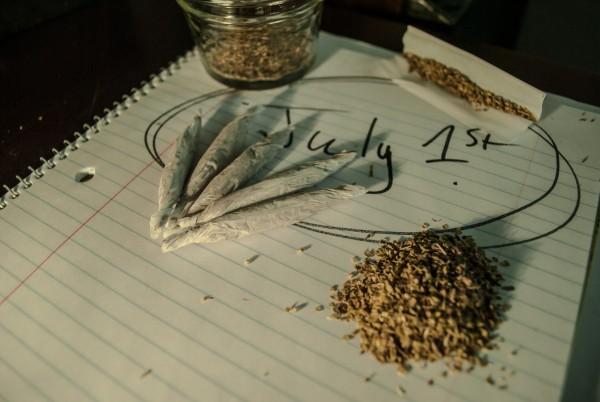With the legalization of recreational marijuana around the corner,
campus officials are discussing the effects on students.
On July 1, 2015, recreational marijuana will be legal to possess
and consume in Oregon, however, the consumption and possession
of marijuana will still be illegal on campus, according to Seth Elliot
of Campus Safety.
“We are a federally funded institution, and because of this, the
rules here don’t essentially change, the realities might, but the rules
don’t,” Elliot said.
In keeping with this, a charge of possession or sale of marijuana
could disqualify students from federal financial aid. According
to the Federal Student Aid website, “[student] eligibility might be
suspended if the offense occurred while you were receiving federal
student aid.”
Recreational users will face the same prohibitions that medical
users currently face, which according to the Central Oregon
Community College Drug Free Campus Policy, means that, “the
unlawful possession, use, or distribution of illicit drugs and alcohol
is prohibited on the College campus in all College facilities, or as
part of any College-sponsored activity.”
For Campus Safety, the priority is education, according to Elliot.
“The first 30 to 60 days, that’s going to be a chance to let people
know… we will see that window as an educational opportunity, not
as a chance to bust people,” Elliot said.
If a student is caught smoking marijuana on campus, they will have
the opportunity to extinguish the contraband and dispose of it. They
can also expect a $50 fine, and a meeting with the office of student
life. According to Elliot, minor offenses generally won’t necessitate
police involvement. This, however, will change with possession and
intent to sell.
“Distribution is going to be a police call that will have higher
consequences,” Elliot said.
Legality aside, Kathy McCabe, a criminal justice professor
on campus, doesn’t believe that the legalization of recreational
marijuana will have a significant impact on student success. “You’re
going to have motivated students who smoke marijuana, motivated
students who don’t smoke marijuana, unmotivated students who
smoke, and unmotivated students who don’t,” McCabe said.
McCabe believes that although there might be some additional
experimental use now that it is legal, a majority of smokers will be
those who already use marijuana recreationally.
“I don’t think this is going to turn into reefer madness,” McCabe
said.
Rebecca Walker-Sands, COCC professor of addiction studies,
added that amotivational syndrome is not conclusive and there is
no proof that marijuana leads to a long term decrease in motivation.
Walker-Sands believes that the regulation of marijuana will take
away the criminal element, which puts individuals into the prison
system unnecessarily. The biggest concern for Walker-Sands is
the pediatric element. In the same way that drinking before your
brain is fully developed can be potentially harmful, so can the
consumption of marijuana, according to Walker-Sands.
“Marijuana is the only drug associated with the early onset of psychosis,” Walker Sands said.
There is concern regarding marijuana as a gateway drug, however,
Walker-Sands denies these claims pointing to the textbook, Drug use
and abuse, wherein the most recent studies point to tobacco as a
bigger gateway drug than marijuana. In fact, according to Walker-
Sands, a study published in the Journal of the American Medical
association, states that legalized medical marijuana since 1999, have
seen a significant decrease in opiate overdoses. No one dies from
marijuana overdoses and in fact the amount of THC, the active “high”
ingredient, required to kill the average human male is 1998mg, which
is equivalent to about 425 joints with 2 percent THC or 140 joints at
30 percent.
“I don’t think it should be maligned the way people are like, ‘oh my
gosh,’ nobody dies from marijuana overdose,” Walker-Sands said.
Kevin Fehrs, owner and operator of The Good Leaf Organic
Collective, a local medical marijuana dispensary added that, “You’re
either going to be happy about it or you’re going to be asleep.”
Despite this Walker-Sands states that while this is true, “That
doesn’t mean there are no downsides.”
Marijuana affects memory consolidation, and for students this
could mean poorer performance on tests, according to Walker-
Sands. In most cases, though, this side effect is only present in the
short term when the user is actually high.
“You might feel more in touch with the universe, but your memory
is going to [suffer],” Walker-Sands said.
Walker-Sands is also concerned about the growing rate of THC
in many marijuana strains, which could lead to an increase in
paranoia, anxiety and psychosis.
Additionally, marijuana has been proven to deposit tar in the
lungs, similar to cigarettes. And while marijuana isn’t smoked
as often as cigarettes, the way it is smoked still deposits tar.
According to Walker-Sands, “They tend to hold it in their
lungs longer so there is more exposure per smoke.”
Although both the physical side effects and the
legal repercussions must be seriously
considered, “It’s not meth, people
tend to just kick back and
go ‘yo baby’ and eat,”
said Walker-Sands.
Categories:
Pot or Not: Student Success and Marijuana
The Broadside Editor
|
Published May 2, 2015

Tags:







